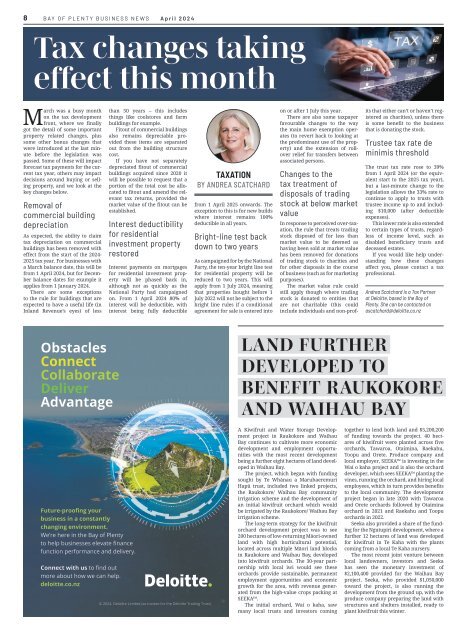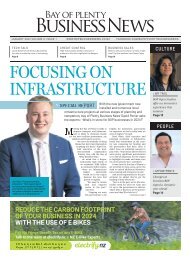April 2024 - Bay of Plenty Business News
From mid-2016 Bay of Plenty businesses have a new voice, Bay of Plenty Business News. This publication reflects the region’s growth and importance as part of the wider central North Island economy.
From mid-2016 Bay of Plenty businesses have a new voice, Bay of Plenty Business News. This publication reflects the region’s growth and importance as part of the wider central North Island economy.
Create successful ePaper yourself
Turn your PDF publications into a flip-book with our unique Google optimized e-Paper software.
8 BAY OF PLENTY BUSINESS NEWS <strong>April</strong> <strong>2024</strong><br />
Tax changes taking<br />
effect this month<br />
March was a busy month<br />
on the tax development<br />
front, where we finally<br />
got the detail <strong>of</strong> some important<br />
property related changes, plus<br />
some other bonus changes that<br />
were introduced at the last minute<br />
before the legislation was<br />
passed. Some <strong>of</strong> these will impact<br />
forecast tax payments for the current<br />
tax year, others may impact<br />
decisions around buying or selling<br />
property, and we look at the<br />
key changes below.<br />
Removal <strong>of</strong><br />
commercial building<br />
depreciation<br />
As expected, the ability to claim<br />
tax depreciation on commercial<br />
buildings has been removed with<br />
effect from the start <strong>of</strong> the <strong>2024</strong>-<br />
2025 tax year. For businesses with<br />
a March balance date, this will be<br />
from 1 <strong>April</strong> <strong>2024</strong>, but for December<br />
balance dates for example it<br />
applies from 1 January <strong>2024</strong>.<br />
There are some exceptions<br />
to the rule for buildings that are<br />
expected to have a useful life (in<br />
Inland Revenue’s eyes) <strong>of</strong> less<br />
than 50 years – this includes<br />
things like coolstores and farm<br />
buildings for example.<br />
Fitout <strong>of</strong> commercial buildings<br />
also remains depreciable provided<br />
these items are separated<br />
out from the building structure<br />
cost.<br />
If you have not separately<br />
depreciated fitout <strong>of</strong> commercial<br />
buildings acquired since 2020 it<br />
will be possible to request that a<br />
portion <strong>of</strong> the total cost be allocated<br />
to fitout and amend the relevant<br />
tax returns, provided the<br />
market value <strong>of</strong> the fitout can be<br />
established.<br />
Interest deductibility<br />
for residential<br />
investment property<br />
restored<br />
Interest payments on mortgages<br />
for residential investment property<br />
will be phased back in,<br />
although not as quickly as the<br />
National Party had campaigned<br />
on. From 1 <strong>April</strong> <strong>2024</strong> 80% <strong>of</strong><br />
interest will be deductible, with<br />
interest being fully deductible<br />
TAXATION<br />
BY ANDREA SCATCHARD<br />
from 1 <strong>April</strong> 2025 onwards. The<br />
exception to this is for new builds<br />
where interest remains 100%<br />
deductible in all years.<br />
Bright-line test back<br />
down to two years<br />
As campaigned for by the National<br />
Party, the ten-year bright line test<br />
for residential property will be<br />
reduced to two years. This will<br />
apply from 1 July <strong>2024</strong>, meaning<br />
that properties bought before 1<br />
July 2022 will not be subject to the<br />
bright line rules if a conditional<br />
agreement for sale is entered into<br />
on or after 1 July this year.<br />
There are also some taxpayer<br />
favourable changes to the way<br />
the main home exemption operates<br />
(to revert back to looking at<br />
the predominant use <strong>of</strong> the property)<br />
and the extension <strong>of</strong> rollover<br />
relief for transfers between<br />
associated persons.<br />
Changes to the<br />
tax treatment <strong>of</strong><br />
disposals <strong>of</strong> trading<br />
stock at below market<br />
value<br />
In response to perceived over-taxation,<br />
the rule that treats trading<br />
stock disposed <strong>of</strong> for less than<br />
market value to be deemed as<br />
having been sold at market value<br />
has been removed for donations<br />
<strong>of</strong> trading stock to charities and<br />
for other disposals in the course<br />
<strong>of</strong> business (such as for marketing<br />
purposes).<br />
The market value rule could<br />
still apply though where trading<br />
stock is donated to entities that<br />
are not charitable (this could<br />
include individuals and non-pr<strong>of</strong>its<br />
that either can’t or haven’t registered<br />
as charities), unless there<br />
is some benefit to the business<br />
that is donating the stock.<br />
Trustee tax rate de<br />
minimis threshold<br />
The trust tax rate rose to 39%<br />
from 1 <strong>April</strong> <strong>2024</strong> (or the equivalent<br />
start to the 2025 tax year),<br />
but a last-minute change to the<br />
legislation allows the 33% rate to<br />
continue to apply to trusts with<br />
trustee income up to and including<br />
$10,000 (after deductible<br />
expenses).<br />
This lower rate is also extended<br />
to certain types <strong>of</strong> trusts, regardless<br />
<strong>of</strong> income level, such as<br />
disabled beneficiary trusts and<br />
deceased estates.<br />
If you would like help understanding<br />
how these changes<br />
affect you, please contact a tax<br />
pr<strong>of</strong>essional.<br />
Andrea Scatchard is a Tax Partner<br />
at Deloitte, based in the <strong>Bay</strong> <strong>of</strong><br />
<strong>Plenty</strong>. She can be contacted on<br />
ascatchard@deloitte.co.nz<br />
Obstacles<br />
Connect<br />
Collaborate<br />
Deliver<br />
Advantage<br />
LAND FURTHER<br />
DEVELOPED TO<br />
BENEFIT RAUKOKORE<br />
AND WAIHAU BAY<br />
Future-pro<strong>of</strong>ing your<br />
business in a constantly<br />
changing environment.<br />
We’re here in the <strong>Bay</strong> <strong>of</strong> <strong>Plenty</strong><br />
to help businesses elevate finance<br />
function performance and delivery.<br />
Connect with us to find out<br />
more about how we can help.<br />
deloitte.co.nz<br />
© <strong>2024</strong>. Deloitte Limited (as trustee for the Deloitte Trading Trust).<br />
A Kiwifruit and Water Storage Development<br />
project in Raukokore and Waihau<br />
<strong>Bay</strong> continues to cultivate more economic<br />
development and employment opportunities<br />
with the most recent development<br />
being a further eight hectares <strong>of</strong> land developed<br />
in Waihau <strong>Bay</strong>.<br />
The project, which began with funding<br />
sought by Te Whānau a Maruhaeremuri<br />
Hapū trust, included two linked projects,<br />
the Raukokore/ Waihau <strong>Bay</strong> community<br />
irrigation scheme and the development <strong>of</strong><br />
an initial kiwifruit orchard which would<br />
be irrigated by the Raukokore/ Waihau <strong>Bay</strong><br />
irrigation scheme.<br />
The long-term strategy for the kiwifruit<br />
orchard development project was to see<br />
200 hectares <strong>of</strong> low-returning Māori-owned<br />
land with high horticultural potential,<br />
located across multiple Māori land blocks<br />
in Raukokore and Waihau <strong>Bay</strong>, developed<br />
into kiwifruit orchards. The 30-year partnership<br />
with local iwi would see these<br />
orchards provide sustainable, permanent<br />
employment opportunities and economic<br />
growth for the area, with revenue generated<br />
from the high-value crops packing at<br />
SEEKA.<br />
The initial orchard, Wai o kaha, saw<br />
many local trusts and investors coming<br />
together to lend both land and $5,200,200<br />
<strong>of</strong> funding towards the project. 40 hectares<br />
<strong>of</strong> kiwifruit were planted across five<br />
orchards, Tawaroa, Otaimina, Raekahu,<br />
Toopu and Orete. Produce company and<br />
local employer, SEEKA is investing in the<br />
Wai o kaha project and is also the orchard<br />
developer, which sees SEEKA planting the<br />
vines, running the orchard, and hiring local<br />
employees, which in turn provides benefits<br />
to the local community. The development<br />
project began in late 2020 with Tawaroa<br />
and Orete orchards followed by Otaimina<br />
orchard in 2021 and Raekahu and Toopu<br />
orchards in 2022.<br />
Seeka also provided a share <strong>of</strong> the funding<br />
for the Ngutupiri development, where a<br />
further 12 hectares <strong>of</strong> land was developed<br />
for kiwifruit in Te Kaha with the plants<br />
coming from a local Te Kaha nursery.<br />
The most recent joint venture between<br />
local landowners, investors and Seeka<br />
has seen the monetary investment <strong>of</strong><br />
$2,100,400 provided for the Waihau <strong>Bay</strong><br />
project. Seeka, who provided $1,050,000<br />
toward the project, is also running the<br />
development from the ground up, with the<br />
produce company preparing the land with<br />
structures and shelters installed, ready to<br />
plant kiwifruit this winter.
















